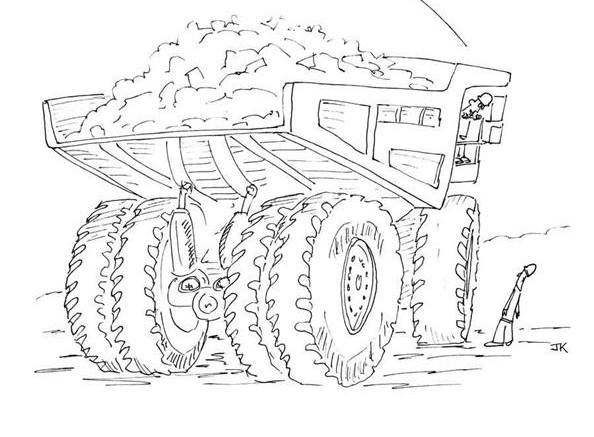Canadians are widely known as some of the best miners in the world, and the Chinese as some of the worst. Just how bad? Since the turn of the millennium, more than 50,000 miners have been killed in China’s coal mines — easily the highest death count in global mining.
And so the emerging plan to bring Chinese miners to work in B.C.’s coal fields doesn’t quite pass the smell test.
It wasn’t that long ago that B.C.’s deeply unpopular Liberal Premier Christy Clark was off in China talking up the $1.4 billion in Chinese investments due to be made in B.C.’s coal sector, with four new mines set to be developed in the province. What she failed to mention is that these Chinese investors are planning to bring up to 2,000 low-paid Chinese miners to carry out most of the work.
Let’s be clear: this would be well-heeled Chinese investors putting up the money and serving as lead managers, migrant Chinese workers flown in to do the heavy lifting, with the coal product shipped to China and corporate profits staying in Chinese hands. It’s hard to see how Canadians could benefit any less from the exploitation of mineral resources under their feet.
Some 200 Chinese are due to arrive in B.C. in the coming weeks to take a 100,000-tonne bulk sample at HD Mining International’s Murray River longwall underground coal mine project, part of the larger Tumbler Ridge project in eastern B.C. It’s located halfway up the province, near the border with Alberta and a day’s drive from the bright lights of booming Edmonton.
The first phase of mine development would cost around $300 million, with the mine slated to produce at a commercial rate of around 6 million tonnes of coal a year starting in 2015, at the beginning of a 30-year mine life. The mine would need about 600 workers, of which around 450 would be Chinese nationals leaving their families at home and working on two-year renewable visas.
HD Mining is majority owned by two Chinese companies: operator Huiyong Holdings (BC) Ltd. (55%) and Canadian Dehua International Mines Group Inc. (40%). Huiyong’s parent company in China operates at least nine mines there. Chinese national Penggui Yan serves as HD chairman and, in an unusual twist, two of HD’s top Canadian managers were until recently assistant deputy ministers in the B.C. government’s resource ministries.
The Chinese miners will be working under the Temporary Foreign Worker Program (TFWP), run by the federal government’s Human Resources and Skills Development department. If you believe working at a good-sized mine operating year-round with a projected 30-year mine life is “temporary” work, you’d probably believe a lot of things that aren’t so.
Under the current TFWP program, employers are required to have made an effort to find suitable Canadian employees before seeking out any foreign workers, by offering wages in-line with the industry and region, and by carrying out a minimum career advertising campaign (Anecdotally, our own careers salesperson, who runs the country’s premiere mining jobs board www.northernminerjobs.com, had never heard of HD Mining or their mine’s requirement for personnel.)
HD Mining had reportedly received 300 Canadian resumes for the mining jobs at hand, and interviewed some 100 candidates. Remarkably, not a single Canadian was hired. HD’s excuse is that Canadians are inexperienced in longwall mining methods, even though the idea of bringing Chinese coal miners to B.C. was first floated in 2007 — easily enough time to teach Canadian workers any mining method imaginable.
HD Mining has been offering in the neighbourhood of $52,000 a year for a job working as an underground miner at Murray River, which strikes us as tens of thousands of dollars less than comparable blue collar jobs in the region, especially given the immense pull of the nearby oilsands megaprojects. (Average miner wages in B.C. are around $34 per hour, or roughly $70,000 per year.) The TFWP dictates that employers can offer 15% under the region’s going rate.
Equally concerning, reporters from B.C.’s Tyee posed as Chinese miners looking for work at HD Mining, and found that at least three recruiting firms in China were charging a prospective miner a $12,500 recruitment fee per job (an astronomical fee for a Chinese worker, amounting to a form of indentured labour), and were advertising wages that were $3 to $5 less per hour than the rates advertised in Canada in English.


“in an unusual twist, two of HD’s top Canadian managers were until recently assistant deputy ministers in the B.C. government’s resource ministries”
Jody Shimkus, Vice President, Environmental and Regulatory Affairs at HD Mining is a former BC assistant deputy resource minister. She appears to have violated government policy, which forbids senior managers from lobbying or otherwise representing an outside company connected to the ministry where they last worked within one year, by taking an executive job at a mining company immediately after leaving office. Shimkus left her post in the Ministry of Natural Resource Operations, which oversees mining in the province, in January 2012 and took a position at HD Mining International in the same month.
Clearly, rules apply only to the great unwashed.